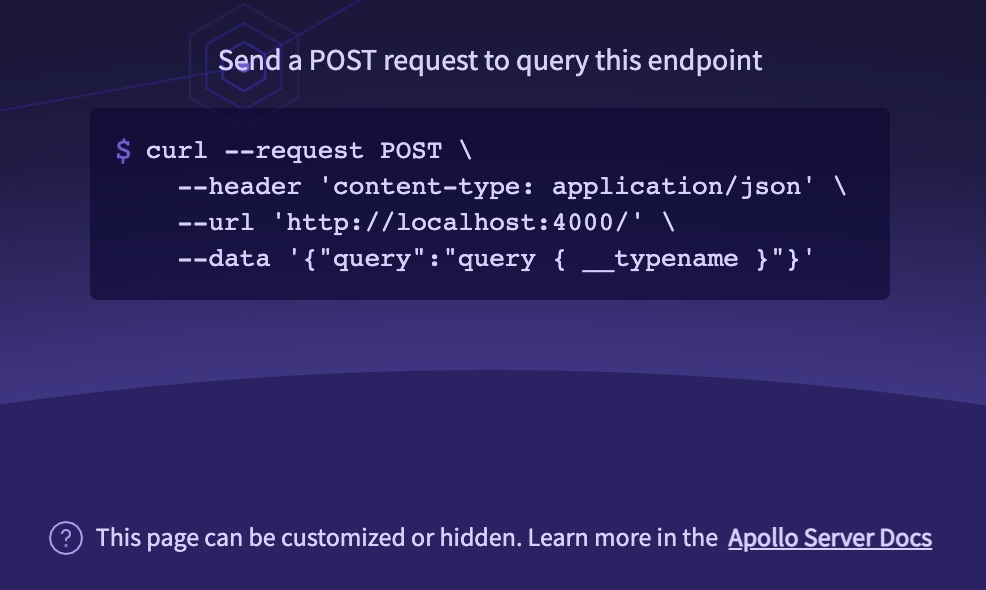Operation request format
How to send requests to Apollo Server over HTTP
Check out this post from the Apollo blog: Making GraphQL Requests using HTTP Methods.
By default, almost every GraphQL IDE and client library takes care of sending operations in a format that Apollo Server supports. This article describes that format, which is also described on graphql.org and in this preliminary spec.
Apollo Server accepts queries and mutations sent as POST requests. It also accepts queries sent as GET requests.
POST requests
Apollo Server accepts POST requests with a JSON body. A valid request contains a query field, along with optional variables and an operationName (if query contains multiple possible operations). You must specify a Content-Type HTTP header with type application/json.
Let's say we want to execute the following query:
query GetBestSellers($category: ProductCategory) {bestSellers(category: $category) {title}}
Here's an example of a valid POST request body for that query:
{"query": "query GetBestSellers($category: ProductCategory){bestSellers(category: $category){title}}","operationName": "GetBestSellers","variables": { "category": "BOOKS" }}
Note that operationName isn't required for this particular request body, because query includes only one operation definition.
You can execute this query against an Apollo-hosted example server right now with the following curl command:
curl --request POST \-H 'Content-Type: application/json' \--data '{"query":"query GetBestSellers($category: ProductCategory){bestSellers(category: $category){title}}", "operationName":"GetBestSellers", "variables":{"category":"BOOKS"}}' \https://rover.apollo.dev/quickstart/products/graphql
Apollo Server's default production landing page provides a curl command you can use to execute a test query on your own server:

Batching
By default, Apollo Server 4 doesn't support batching HTTP requests. To enable HTTP batching, you must explicitly pass allowBatchedHttpRequests: true to the ApolloServer constructor.
If you have enabled HTTP batching, you can send a batch of queries in a single POST request by providing a JSON-encoded array of query objects, like so:
[{"query": "query { testString }"},{"query": "query AnotherQuery{ test(who: \"you\" ) }"}]
If you send a batched request, Apollo Server responds with a corresponding array of GraphQL responses.
Note: If multiple operations in a request try to set the same HTTP response header (via error extensions or plugins), headers from later operations will take precedence on a per-header basis.
GET requests
Apollo Server also accepts GET requests for queries (but not mutations). With a GET request, query details (query, operationName, variables) are provided as URL query parameters. The variables option is a URL-escaped JSON object.
Sending queries as GET requests can help with CDN caching.
Here's the same query from POST requests formatted for a curl GET request:
curl --request GET \https://rover.apollo.dev/quickstart/products/graphql?query=query%20GetBestSellers%28%24category%3A%20ProductCategory%29%7BbestSellers%28category%3A%20%24category%29%7Btitle%7D%7D&operationName=GetBestSellers&variables=%7B%22category%22%3A%22BOOKS%22%7D
Unlike with POST requests, GET requests do not require a Content-Type header. However, if you have Apollo Server 4's default CSRF prevention feature enabled, GET requests that don't contain a Content-Type header must contain one of the following:
- A non-empty
X-Apollo-Operation-Nameheader - A non-empty
Apollo-Require-Preflightheader
For more details, see the CSRF prevention documentation.
Incremental delivery (experimental)
Incremental delivery is a Stage 2: Draft Proposal to the GraphQL specification which adds @defer and @stream executable directives. These directives allow clients to specify that parts of an operation can be sent after an initial response, so that slower fields do not delay all other fields. As of September 2022, the graphql library (also known as graphql-js) upon which Apollo Server is built implements incremental delivery only in the unreleased major version 17. If a pre-release of graphql@17 is installed in your server, Apollo Server 4 can execute these incremental delivery directives and provide streaming multipart/mixed responses.
Clients sending operations with incremental delivery directives need to explicitly indicate that they are expecting to receive multipart/mixed responses in an accept header. Moreover, because incremental delivery has not yet been finalized in the GraphQL spec and may change before the final version, they need to specify that they expect the particular response format that Apollo Server produces today via a deferSpec parameter. Specifically, clients prepared to accept incremental delivery responses should send an accept header like multipart/mixed; deferSpec=20220824. Note that this header implies that only multipart responses should be accepted; typically, clients will send an accept header like multipart/mixed; deferSpec=20220824, application/json indicating that either multipart or single-part responses are acceptable.
You cannot combine batching with incremental delivery in the same request.